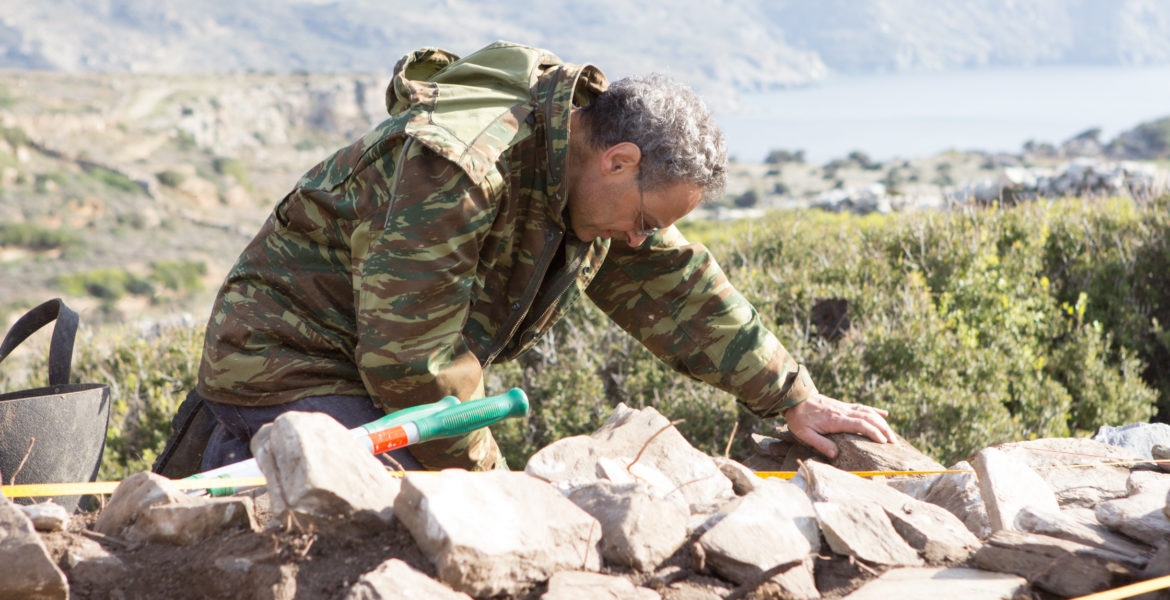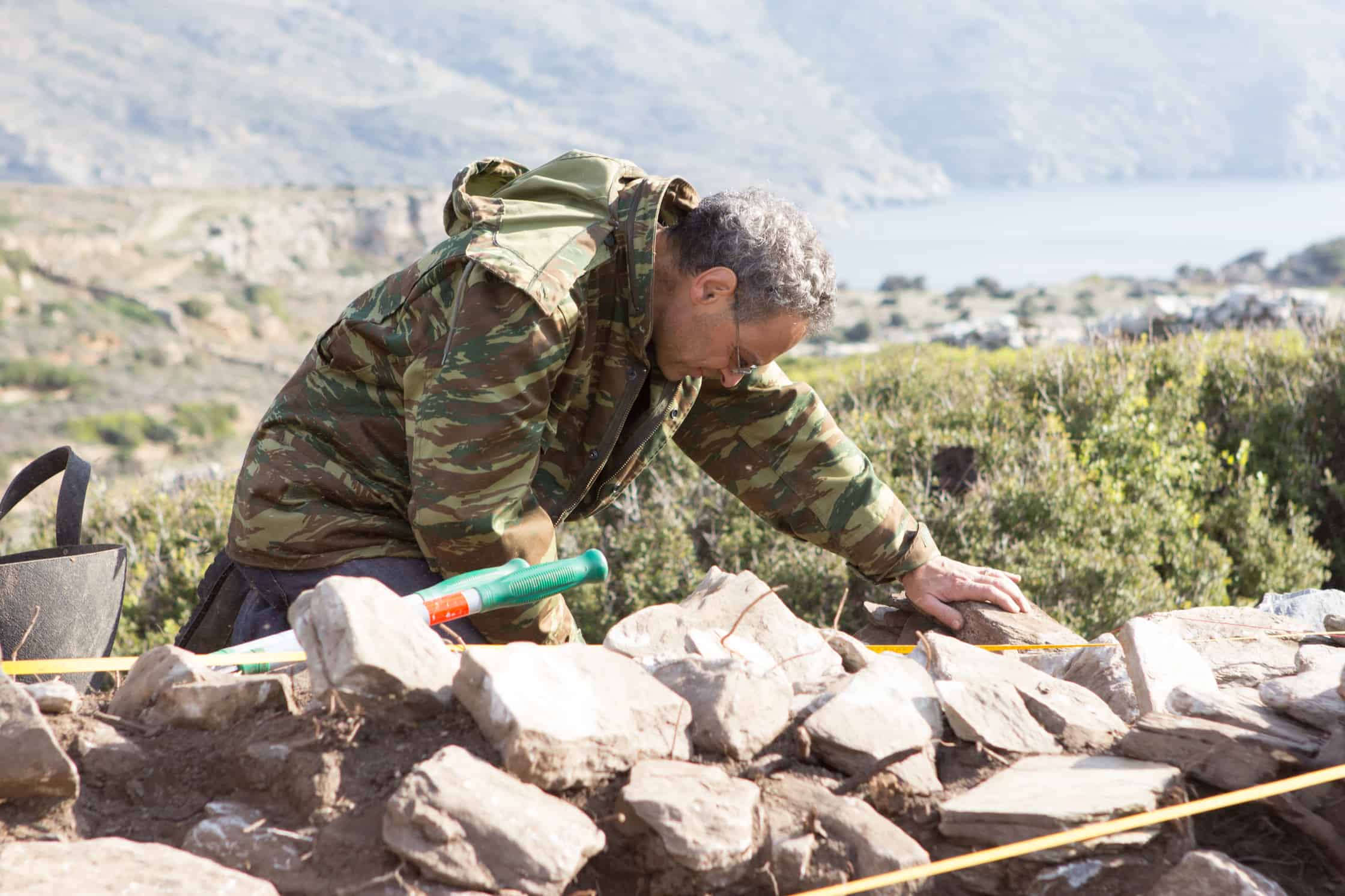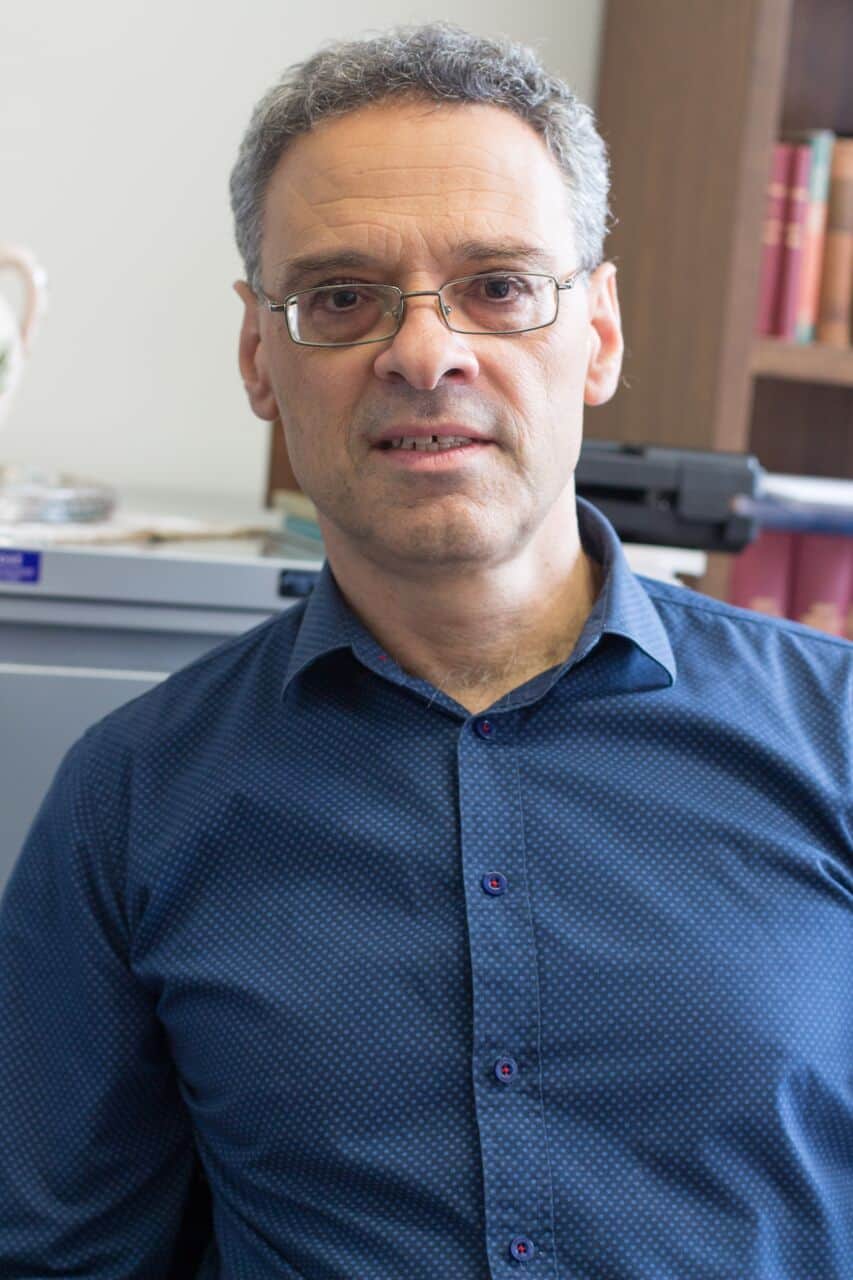Spend ten minutes in his presence and he’ll have you wondering why you haven’t spent more time contemplating and questioning the past and exploring all that it can teach us.
For Dr Stavros Paspalas, it is his lifelong interest of the past which drove him to the world of archaeology. In addition to working on sites such as Zagora and Torone, he has published on the cultural exchanges between Greece and its eastern neighbours, ceramic studies, and matters related to the iconography of the ancient world. He is also the Acting Director of the Australian Archaeological Institute at Athens.
GCT recently spoke to Dr Paspalas about his love of archaeology, his continued enthusiasm and interest in sites such as Torone and Zagora, and the importance of piecing together our history.
Where were you born?
I was born and raised in Sydney.
Where are your ancestors from?
We are Kytherians, or Tsirigotes as we commonly refer to ourselves. (Actually, if I were to be precise I’m 7/8th Kytherian as I should recognise a great-grandmother who renders me 1/8thTsakonian, from Leonidio, as well.)
Did you always want to be an archaeologist?
Most definitely. As corny as it may sound I must confess that I can’t remember a time when I didn’t want to be an archaeologist.
How is the field of archaeology different now compared with 30 years ago?
There is a greater emphasis now on archaeometry, that is scientific applications to the material record that past societies have left behind. There were, of course, elements of this in classical archaeology 30 years ago, but it is far more central nowadays to what we do. New discoveries and the developments of new investigative techniques have opened up unforeseen vistas.
So, nowadays soil micromorphologists, archaeobotanists, researchers working on isotopic analyses of human and animal bones and the like are central to excavations alongside specialists in more traditional archaeological pursuits.
It is also the case that classical archaeologists are more likely to look at the methods and theories of archaeologists who work elsewhere in the world. This too is not a total innovation but it is now more common. And, of course, classical archaeology has its own contributions to make to global archaeological practice.
What has been the biggest highlight of your career?
Well, on one level it is the thrill of discovery. And I don’t mean something like finding a horde of precious objects but rather of finding something that adds another piece to an unresolved puzzle. This might be, for example, as humble as pottery fragments that may date a certain building or burial, or a discovery that is not actually made in the field but in a library.
Archaeologists are interested in piecing together systems from the past and so creating narratives that relate how past peoples lived, and for this we need links and these come in all sorts of materials, shapes and sizes.
On another level I remember my excitement of excavating my first ever burial as a very green student in Bahrain many years ago. That memory, and the way I had to carefully expose the skeleton will remain with me forever –although I do acknowledge that it may appear rather odd, if not morbid, to others.
What have been some of your biggest challenges?
Truth be told although undertaking research is hard work I enjoy it and I am fortunate to have worked, and continue to do so, with excellent colleagues. So, I don’t categorise archaeological work as such as a challenge, although it must be said that organising field seasons is not a walk in the park. Honestly, though, one of the greatest challenges is raising the funds required to conduct archaeological fieldwork and research. On various projects which I have been involved I, along with my colleagues, have successfully applied for significant grants, and such results are always welcome.

What have you specialized in and why?
I first specialised in the archaeology of the ancient Greek city of Torone, in the Halkidiki peninsula –southeast of Thessaloniki. This was the first excavation, directed by Professor Alexander Cambitolgou, in which I participated in Greece as a student from the University of Sydney. I did my Masters of Arts degree on finds from this site and then I proceeded to do a doctorate which looked at material from Torone alongside similar finds made from islands such as Samos and Chios and the mainland opposite them. My interests in East Greece developed further with the result that I published on some of the links between the Greek world and their closest eastern neighbours, the Lydians. Similar concerns led me to study the relations between Macedonia and the Persian (Achaemenid) Empire, particularly in the period before Alexander the Great’s conquests.
More recently I have been engaged in a major project at the 9thand 8thcentury BC settlement site of Zagora on the island of Andros. Professor Cambitoglou started a series of campaigns there, that ran from 1967 through to 1974. I, of course, was far too young to participate in them then, but in 2012 my fellow co-directors (Professor Margaret Miller and Associate Professor Lesley Beaumont from the University of Sydney) of the Zagora Archaeological Project and I returned with a large team and conducted fieldwork at this truly uniquely well preserved settlement for three seasons, which we and our colleagues are now preparing for publication.
I have also been fortunate enough to co-direct with Professor Timothy Gregory (Ohio State University) and my colleague at the AAIA Dr Lita Tzortzopoulou-Gregory an important archaeological field survey in the northern area of Kythera.
What does it feel like to work on sites such as Torone and Zagora?
In a word: privileged! I believe that every participant in archaeological fieldwork must approach it with an acute sense of responsibility. You’re part of a team that has been granted the privilege to examine, actually reveal, primary evidence and that can only be done once. You can’t re-excavate the same trench. At the Australian Archaeological Institute at Athens we’re very conscious of this responsibility. We’re also very grateful to the Greek Ministry of Culture for granting permits for our research programs, and -of course- to the Archaeological Society of Athens with which we have collaborated over meany years at Torone and Zagora.
Where would you love to lead an excavation and what would you love to find?
The unattainable dream is to find the tomb of Alexander the Great. However, given that his tomb in Alexandria was destroyed long ago that is not possible. Far more realistically I consider myself unbelievably fortunate in being able to work at Zagora. This is truly an amazing site which has so much to offer us regarding our understanding of the period in which the Homeric epics took on the form by which we know them today, the Greeks adopted the alphabet, the process that led to the formation of the poleis(city-states) started in earnest, and the list of milestones goes on and on. It also allows us to gain an understanding as to why people choose to establish settlements in particular locations and, very importantly, why they choose (or are compelled) to leave them as happened at Zagora in about 700 BC. At this site we can examine various possibilities: social, economic, environmental and the like –all of which are very topical when we try to make sense of our own world today and the constraints that play upon human communities.
What has been your most important discovery?
That is a hard question. I think my important contribution is the cumulative effect of many discoveries for that is what leads to a better understanding of the past. One-offs remain just that, they only take on a meaning when they can be placed into a context.
Who has been your biggest influence?
Clearly my teachers, and here Professor Cambitoglou in particular. He first gave me the opportunity to take archaeology seriously and he has supported me throughout my career. I am very grateful to him. I must say that I was very fortunate to have studied at the University of Sydney when I did as the teachers I had, both in Classical and in Near Eastern Archaeology, were excellent. And even earlier I have my parents to thank for cultivating in me a love of the past and encouraging me to pursue it.
What has it been like to work alongside Professor Alexander Cambitoglou?
It has been rewardingly demanding but most importantly horizon-broadening. Research demands discipline and imagination and Professor Cambitoglou has impressed upon all who came within his sway the importance of these two qualities.
What is the most important lesson you teach your students?
As old an answer as it is I still believe that all students should continually ask “why?” Why do I hold the opinion I do on topics x, y and z? What is its justification? In this way they will become both comfortable with and truly knowledgeable in their chosen field.
What inspires you?
I simply love to find out more about the past. To determine what we can and cannot say about those who preceded us. I find that thought very inspiring. I also find truly inspiring the many students (and others) who volunteer to participate in archaeological field projects. Their commitment and excitement is simply contagious. And, of course, the many members of the general public who support the AAIA are a source of unending inspiration. We clearly share a deep interest in the past, particularly the Greek past, so when I talk with them or deliver lectures for them I feel that I receive more than I give. And, indeed, our supporters throughout Australia are vital to the survival of the AAIA so it is a pleasure to present our work to them through lectures, our Bulletinand Newsletters. I should also mention that a number of these supporters have been very generous indeed –and their generosity has allowed the AAIA to achieve what it has. Their very practical vote of confidence in the AAIA spurs my colleagues and myself onwards.
What will you be working on in the next couple of years?
For the next couple of years I shall be very heavily focussed on Zagora, but I do hope to return to study of the finds made at Torone, and –of course– I shall work with my colleagues on our findings from Kythera.
What would you advise someone who is thinking about enrolling in archaeology?
Do so! While archaeology clearly focusses on the past, fundamentally archaeologists study human beings and their multiple worlds, which means that we learn about our own world in the process. It is unquestionably a very rewarding field of study on many different levels.
*For further information on the Australian Archaeological Institute at Athens (AAIA) please see sydney.edu.au/arts/aaia/



